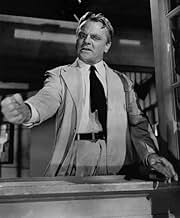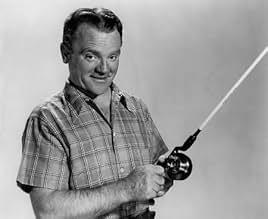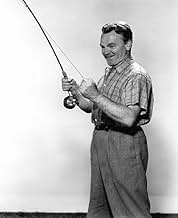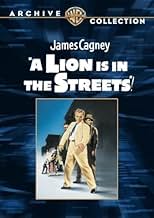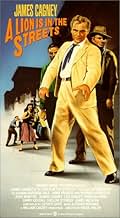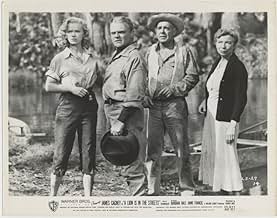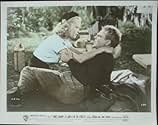IMDb RATING
6.1/10
1.1K
YOUR RATING
A charismatic peddler from the bayous finds his true calling in politics. Is he a demagogue in the making?A charismatic peddler from the bayous finds his true calling in politics. Is he a demagogue in the making?A charismatic peddler from the bayous finds his true calling in politics. Is he a demagogue in the making?
Lon Chaney Jr.
- Spurge McManamee
- (as Lon Chaney)
Lee Aaker
- Johnny Briscoe
- (uncredited)
Victor Adamson
- Townsman
- (uncredited)
Carl Andre
- Townsman
- (uncredited)
Nadine Ashdown
- Minor Role
- (uncredited)
- Director
- Writers
- All cast & crew
- Production, box office & more at IMDbPro
Featured reviews
I guess Cagney took the "lion" part literally since he roars all the way through. Unfortunately, it does get tiresome. That along with a brash behavior competes with plot development muddying overall impact. Perhaps Cagney saw a need to out-bluster award winning Broderick Crawford in 1950's thematically similar All The King's Men. Don't get me wrong-I'm a long time Cagney fan, but his turn here amounts almost to a caricature of his usual dynamic persona.
The movie itself lacks impact, mainly because of a screenplay that fails to concentrate Hank's (Cagney) trickery into a central focus. Instead, the story veers around in rather murky fashion, particularly with the political conniving that leads to Hank's downfall. For example, see if you can sort out the Castleberry, Polli, Beach, Rector, roles leading to Hank's downfall. Or figure out the clumsily developed Jeb Brown legal proceedings. To me, the script badly needed a re-write. Also, the casting of the women's roles requires a stretch. Hale's Verity appears much too refined for loud-mouth Hank, while Francis's Flamingo(!) appears about 20-years too young. These appear aimed at reinforcing Hank's blustery charisma. Anyway, I did like the 'one for all' bonding of the sharecroppers, especially when they transform Hank's shack into a bright bungalow. Also, the way the gin mill cheats is enlightening and I expect really happened to cotton growers. So there are compensations. However, the movie itself strikes me as one of Cagney's lessers and shows why it's seldom included in his iconic canon.
The movie itself lacks impact, mainly because of a screenplay that fails to concentrate Hank's (Cagney) trickery into a central focus. Instead, the story veers around in rather murky fashion, particularly with the political conniving that leads to Hank's downfall. For example, see if you can sort out the Castleberry, Polli, Beach, Rector, roles leading to Hank's downfall. Or figure out the clumsily developed Jeb Brown legal proceedings. To me, the script badly needed a re-write. Also, the casting of the women's roles requires a stretch. Hale's Verity appears much too refined for loud-mouth Hank, while Francis's Flamingo(!) appears about 20-years too young. These appear aimed at reinforcing Hank's blustery charisma. Anyway, I did like the 'one for all' bonding of the sharecroppers, especially when they transform Hank's shack into a bright bungalow. Also, the way the gin mill cheats is enlightening and I expect really happened to cotton growers. So there are compensations. However, the movie itself strikes me as one of Cagney's lessers and shows why it's seldom included in his iconic canon.
It's unfortunate that A Lion Is In the Streets came out after All the King's Men. Both films were based in part on the legend of Huey Long. I think All the King's Men is better, but A Lion Is in the Streets has its moments.
For one thing it has the dynamic presence of James Cagney. You would hardly think that the very urban Mr. Cagney could pull off the role of a southern demagogue, but pull it off he does. It's the story of a man who is an itinerant peddler with a good gift of gab. You like him in those first few minutes of the film as the peddler takes shelter in Barbara Hale's one room schoolhouse. But as he discovers his gift for demagoguery he fascinates and repels the viewer as much as he enthralls the crowds in the film.
For another since our protagonist doesn't quite get to the heights that Broderick Crawford did in All the King's Men, it instead concentrates more on the man's humble beginnings. Instead of being a farmer who was educated by his wife as Broderick Crawford was in All the King's Men, the real Huey Long in fact was an itinerant peddler who was educated by his wife Rose McConnell Long. In fact Huey, Rose, and Russell are the answer to a trivia question as being the only parents and child who served in the United States Senate. Rose was given a temporary appointment to his seat following Long's assassination and son Russell had a considerable career in the Senate himself.
Barbara Hale's role is pretty modest, but that's how Rose McConnell was in real life. In their marriage she put up with quite a lot from Huey.
James Cagney produced this one himself with brother William Cagney taking on the administrative responsibilities and both of them giving little sister Jeanne Cagney her career role. She's the wife of luckless sharecropper John McIntire whose death Cagney demagogues for all its worth. The scene with the dying McIntire in court will chill you with fright. Jeanne is a true believer in Cagney the man and it's her disillusionment with him that leads to the shattering climax.
Other good performances in the cast are Anne Francis as bayou mantrap Flamingo, Larry Keating as the stuffed shirt that Cagney attacks for his own ends, and Lon Chaney, Jr. who is Francis's stern father.
It's not as good as All the King's Men, but A Lion is in the Streets has a lot to recommend it.
For one thing it has the dynamic presence of James Cagney. You would hardly think that the very urban Mr. Cagney could pull off the role of a southern demagogue, but pull it off he does. It's the story of a man who is an itinerant peddler with a good gift of gab. You like him in those first few minutes of the film as the peddler takes shelter in Barbara Hale's one room schoolhouse. But as he discovers his gift for demagoguery he fascinates and repels the viewer as much as he enthralls the crowds in the film.
For another since our protagonist doesn't quite get to the heights that Broderick Crawford did in All the King's Men, it instead concentrates more on the man's humble beginnings. Instead of being a farmer who was educated by his wife as Broderick Crawford was in All the King's Men, the real Huey Long in fact was an itinerant peddler who was educated by his wife Rose McConnell Long. In fact Huey, Rose, and Russell are the answer to a trivia question as being the only parents and child who served in the United States Senate. Rose was given a temporary appointment to his seat following Long's assassination and son Russell had a considerable career in the Senate himself.
Barbara Hale's role is pretty modest, but that's how Rose McConnell was in real life. In their marriage she put up with quite a lot from Huey.
James Cagney produced this one himself with brother William Cagney taking on the administrative responsibilities and both of them giving little sister Jeanne Cagney her career role. She's the wife of luckless sharecropper John McIntire whose death Cagney demagogues for all its worth. The scene with the dying McIntire in court will chill you with fright. Jeanne is a true believer in Cagney the man and it's her disillusionment with him that leads to the shattering climax.
Other good performances in the cast are Anne Francis as bayou mantrap Flamingo, Larry Keating as the stuffed shirt that Cagney attacks for his own ends, and Lon Chaney, Jr. who is Francis's stern father.
It's not as good as All the King's Men, but A Lion is in the Streets has a lot to recommend it.
More like a bull in a china shop! Cagney completely unfettered here, carrying everything before him in a typical barn-storming performance of sheer bravura.
Forget all the succeeding shortcomings of the plot, they're there from the start and almost far too numerous to mention, but let's just throw some in - like Cagney's whirlwind romance with too-young-for-him school-marm Barbara Hale and even more ridiculous fling with far-too-much-younger-for-him Anne Francis as a wild-child with a crush on our hero, who in a "hath no fury" scorned moment improbably tries to feed Cagney's new bride to the crocodiles, mix in a plumb-loco trial scene where Cagney props up a dying witness to testify for his innocence even as he expires on the stand and grandstand it all with Cagney's "Kingfish" character Hank Martin getting shot at point-blank range by the widow of the same dying witness when Cagney's treachery in thrall of power is exposed, just at the point when he's fathered his first child and lost the election to boot!.
Only Raoul Walsh could whip all this into, I hesitate to call it shape and in under 90 minutes at that. Shot in gleaming technicolour, with hordes of well-marshaled crowd scenes and with Cagney threatening to self-combust from the off, this has to be one of the most preposterous films I've ever watched. You could argue with some justification that the great man chews more scenery than Hungry Horace, but best just to surrender yourself to the whirlwind, suspend all disbelief and see where it deposits you. It may not be Oz, but there's certainly a wizard at work here.
Forget all the succeeding shortcomings of the plot, they're there from the start and almost far too numerous to mention, but let's just throw some in - like Cagney's whirlwind romance with too-young-for-him school-marm Barbara Hale and even more ridiculous fling with far-too-much-younger-for-him Anne Francis as a wild-child with a crush on our hero, who in a "hath no fury" scorned moment improbably tries to feed Cagney's new bride to the crocodiles, mix in a plumb-loco trial scene where Cagney props up a dying witness to testify for his innocence even as he expires on the stand and grandstand it all with Cagney's "Kingfish" character Hank Martin getting shot at point-blank range by the widow of the same dying witness when Cagney's treachery in thrall of power is exposed, just at the point when he's fathered his first child and lost the election to boot!.
Only Raoul Walsh could whip all this into, I hesitate to call it shape and in under 90 minutes at that. Shot in gleaming technicolour, with hordes of well-marshaled crowd scenes and with Cagney threatening to self-combust from the off, this has to be one of the most preposterous films I've ever watched. You could argue with some justification that the great man chews more scenery than Hungry Horace, but best just to surrender yourself to the whirlwind, suspend all disbelief and see where it deposits you. It may not be Oz, but there's certainly a wizard at work here.
I am a massive fan of James Cagney as an actor. I've loved some of the films he starred in, tolerated more. This one falls into the second camp. It is by no means a bad or unworthy film, but it really fails to compel.
Cagney is of course, irreproachable and effortlessly walks away with the film, but he just isn't quite as compelling a figure here as in "White Heat", "Angels with Dirty Faces" or that splendid musical, "Yankee Doodle Dandy". Perhaps it is because the character is really more predictable than most of his characters; based on the Huey Long template. There was not the sense that I was rooting for his character in the same odd way that I usually do when he is essaying a villainous part.
The film is visually quite opulent, but hardly overpoweringly. Perhaps monochrome would have better suited the film's fairly straight forward moral message. The characters, save Cagney's demagogue, are far from that interesting, and play little part, other than be part of the rural "mob" that Cagney is inciting, or part of the slick, gangster-swayed metropolitan set, who replenish Cagney's corruption.
This film just isn't compelling enough; it has a lack of interesting incident, character or dialogue, and while it is morally in a worthy cause (in the era of McCarthy) it is too small a fry in the largely incendiary career of Cagney.
Rating:- ***/*****
Cagney is of course, irreproachable and effortlessly walks away with the film, but he just isn't quite as compelling a figure here as in "White Heat", "Angels with Dirty Faces" or that splendid musical, "Yankee Doodle Dandy". Perhaps it is because the character is really more predictable than most of his characters; based on the Huey Long template. There was not the sense that I was rooting for his character in the same odd way that I usually do when he is essaying a villainous part.
The film is visually quite opulent, but hardly overpoweringly. Perhaps monochrome would have better suited the film's fairly straight forward moral message. The characters, save Cagney's demagogue, are far from that interesting, and play little part, other than be part of the rural "mob" that Cagney is inciting, or part of the slick, gangster-swayed metropolitan set, who replenish Cagney's corruption.
This film just isn't compelling enough; it has a lack of interesting incident, character or dialogue, and while it is morally in a worthy cause (in the era of McCarthy) it is too small a fry in the largely incendiary career of Cagney.
Rating:- ***/*****
... that is basically a poor man's "All The King's Men". I can't remember ever giving a James Cagney film less than a 6/10, if only because of James Cagney. This would probably get a 3 or 4 without him.
There's no chance for any of the cast to do any real character development as you jump from scene to scene. Cagney's Hank Martin is a bayou peddler who aspires to political office claiming to be a man of the people. He makes goofy moves considering he is an aspiring politician, with his rise to fame based on one scandal that Hank uncovers and a murder that results. Cagney assumes it is cotton gin owner and merchant Castleberry behind everything, but by the end of the film when I was told who was actually behind it, I just went WHO? And had to back up into the film to even see who this person was. And you haven't lived until you've seen a dead man -actually sitting in the courtroom - tried for murder.
Barbara Hale plays Hank's school marm wife. Ann Francis plays a bayou girl with a crush on Cagney who first tries to feed Hale to the alligators to get rid of her, then just pushes Hank - she doesn't have to push hard - until he relents and begins cheating on his wife with her. One interesting thing here - Frank McHugh as a malicious person. You don't see that very often. And I have no idea why a hound dog sleeping at the foot of the Lincoln Memorial has anything to do with this story, symbolically or otherwise.
I'd suggest it for Cagney completists and probably nobody else.
There's no chance for any of the cast to do any real character development as you jump from scene to scene. Cagney's Hank Martin is a bayou peddler who aspires to political office claiming to be a man of the people. He makes goofy moves considering he is an aspiring politician, with his rise to fame based on one scandal that Hank uncovers and a murder that results. Cagney assumes it is cotton gin owner and merchant Castleberry behind everything, but by the end of the film when I was told who was actually behind it, I just went WHO? And had to back up into the film to even see who this person was. And you haven't lived until you've seen a dead man -actually sitting in the courtroom - tried for murder.
Barbara Hale plays Hank's school marm wife. Ann Francis plays a bayou girl with a crush on Cagney who first tries to feed Hale to the alligators to get rid of her, then just pushes Hank - she doesn't have to push hard - until he relents and begins cheating on his wife with her. One interesting thing here - Frank McHugh as a malicious person. You don't see that very often. And I have no idea why a hound dog sleeping at the foot of the Lincoln Memorial has anything to do with this story, symbolically or otherwise.
I'd suggest it for Cagney completists and probably nobody else.
Did you know
- TriviaEleventh and final time that James Cagney co-starred with his close friend Frank McHugh, the first time being La foule hurle (1932).
- Goofs(at around 15 mins) Hank and Verity are walking towards Mr. Castleberry's mansion, a boom mic shadow can be seen moving in front of them, going from the top to the middle of the screen.
- Quotes
Verity Wade: It's these folks. They're all so wonderful.
Hank Martin: Well, all folks is wonderful. You just have to know the right place to kick 'em in.
Verity Wade: What?
Hank Martin: Sure. It's like learnin' to play a musical instrument by ear. All you gotta know is what place to push to get what note. Then pretty soon, everybody's dancin'...to your tune.
- Alternate versionsThe most commonly shown television version was very extensively cut (over 20 minutes) for time, mainly in the second half, to the point where the plot is very hard to follow.
- How long is A Lion Is in the Streets?Powered by Alexa
Details
- Runtime1 hour 28 minutes
- Aspect ratio
- 1.37 : 1
Contribute to this page
Suggest an edit or add missing content

